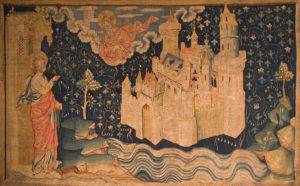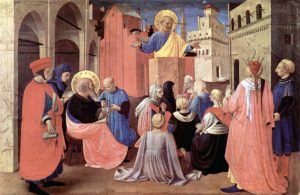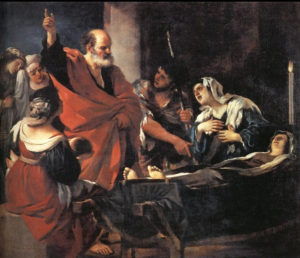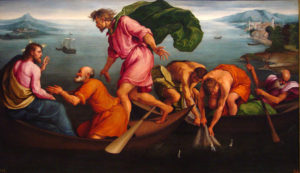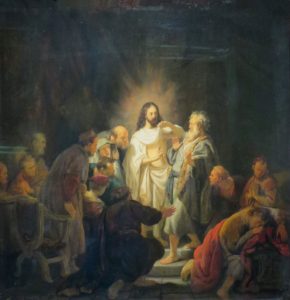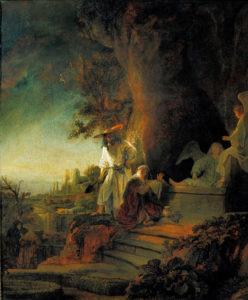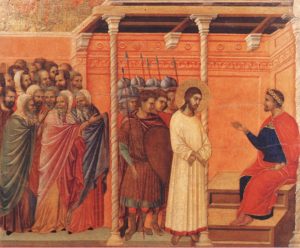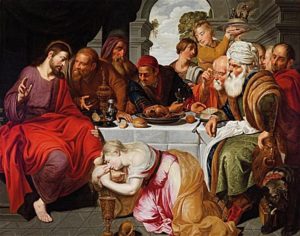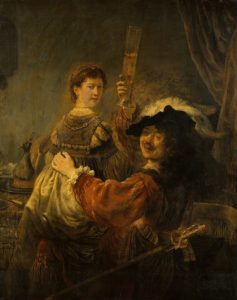Thoughts on Sunday’s Lessons for June 2, 2019
First Reading: Acts 16:16-34
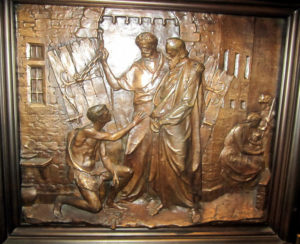
Jailer, Paul, Silas, and the Jailer’s Family; bronze metalwork panel on the north door of Trinity Church, Manhattan (1893). Design by Richard Morris Hunt (1827-1895), produced by Charles Henry Hiehaus; Donated by William Waldorf Astor in memory of his father, John Jacob Astor III. (Click image to enlarge.)
As we near the end of Eastertide, we find Paul still in Philippi, where he encounters a noisy woman, possessed by a demon, who is held as a slave by men who present her as a fortune teller because of her loud, prophetic-sounding shouts. She follows Paul and Silas around, declaring them “slaves of the most high God.” Paul, annoyed, casts the spirit out of her, silencing her shouts. Her masters, angry over the loss of their income, have Paul and the others jailed for disturbing the peace. They pray for relief, and an earthquake bursts open the prison doors and breaks their chains. Paul and his companions refuse to leave, though, saving the jailer from punishment. The jailer asks what he must do to be saved, and Paul tells him to believe in Christ.
Psalm: Psalm 97
This Psalm of thanks and praise begins with language that may seem difficult for modern ears. It confronts us with the loud, chest-thumping shouts of Bronze Age warriors, a genre that’s difficult to place in the context of modern times. As with any complicated story, sometimes it’s best to peek at the ending and and see how it comes out. The happy ending of this Psalm reassures us that God brings light and joy for the righteous and the upright in heart. Practice righteousness: Insist on justice for the weak, not just the strong; resist evil, and give thanks that God loves us.
Second Reading: Revelation 22:12-14, 16-17, 20-21
We come now to the closing verses of Revelation, in a Lectionary passage that, perhaps wisely, skips over a couple of the book’s more alarming passages that you might enjoy picking up your bible to discover. The portion that we do hear speaks to many in the early church expected that the Lamb – the sacrificed and resurrected Jesus Christ – would return very soon, ideally during their own lifetimes. Two thousand years later, we have found that life and eternity and God’s kingdom aren’t that simple. But the message of the Lamb still brings us hope: “Let everyone who is thirsty come. Let anyone who wishes take the water of life as a gift. … Come, Lord Jesus!”
Gospel: John 17:20-26
We now reach the end of John’s account of Jesus’s farewell talk with his apostles. John’s extended four-chapter narrative began after Jesus had washed their feet and celebrated their last supper together, and now concludes just before Jesus will go out to the garden to pray, where Judas and the soldiers will come in the night to take him away for trial and crucifixion. In Sunday’s familiar verses we hear Jesus asking God to love everyone just as God has loved Jesus. Yes, everyone: Jesus prays not only for his friends in the room then and there, but asks God to love all the people of the world, promising that all who believe in him “may be one, as we are one, I in them and you in me.”

